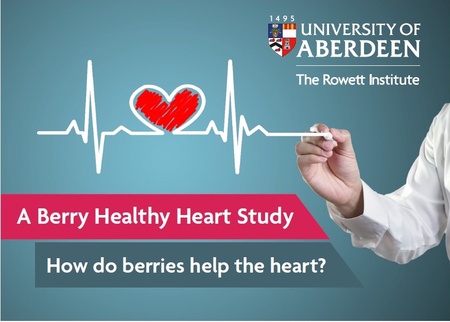Overweight men are being invited to take part in a 'berry' exciting new nutritional study, which may help find ways to decrease the risk of developing heart disease in healthy populations.
The study, which is being carried out by the University of Aberdeen’s Rowett Institute in conjunction with the university’s Cardiac Research Facility, requires 36 participants, aged 40 to 75 years, who have a waist circumference of 94cm or more, to test the benefits of taking a berry extract daily for 12 weeks.
Chief Investigator, Dr Vanessa Rungapamestry, said that people who are overweight and have higher than recommended levels of blood sugar and/or cholesterol are at increased risk of heart disease.
One potential way to help manage these risk factors is to use a natural, food supplement as a safer and more acceptable alternative to drugs.
“Through this study, we are aiming to find out whether a commercially-produced berry extract improves heart health in overweight individuals who are generally healthy, but at moderate risk of heart disease,” said Dr Rungapamestry.
“The berry to be studied is currently underused and is reported to contain one of the highest levels of natural health-promoting components amongst berries. Our goal is to test whether taking a daily dose of an extract of this berry, equivalent to eating a handful of fresh berries, for 12 weeks improves heart health and function.
“We aim to recruit overweight men to participate in this nutritional study, provide blood samples, and allow us to measure their blood pressure and blood vessel health at the start and end of the study.”
Those taking part in the study will be expected to take a daily food supplement and attend nine morning appointments at the Human Nutrition Unit of the Rowett Institute or Aberdeen Royal Infirmary for study visits over a 28-week period. They will also be asked to wear a small automated device to record their blood pressure for 24 hours, following four of the visits.
If you are interested in taking part in the study, please contact Dr Vanessa Rungapamestry, Chief Investigator. Telephone: (01224) 438618 or v.rungapamestry@abdn.ac.uk or Mrs Gail Hempseed, Research assistant on (01224) 438688 or g.hempseed@abdn.ac.uk


